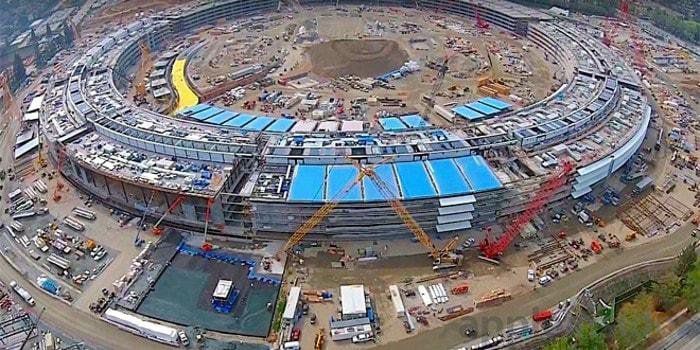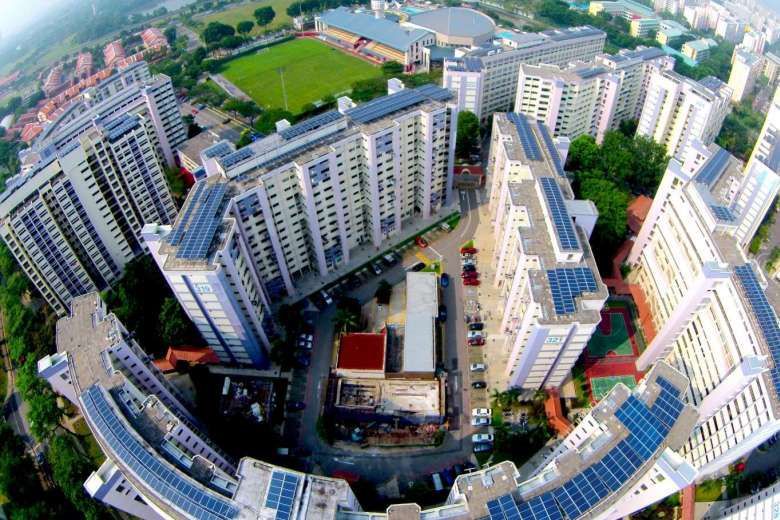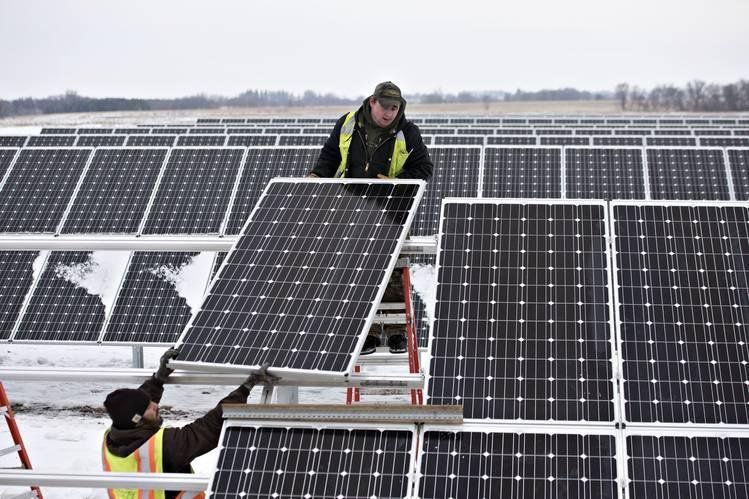NEW APPLE HEADQUARTERS SETS RECORDS IN SOLAR AND GREEN BUILDING
July 14, 2020
New Apple Headquarters Sets Records in Solar and Green Building
Apple announced that it will open its new 175-acre campus to employees beginning in April. The campus is powered 100 percent by renewable energy and will include 17 MW of rooftop solar. Apple Park will be one of the largest on-site solar installations in the world.
The building will also be the world's largest naturally ventilated building, projected to require no heating or air condition for nine months of the year.
The campus will be supported by a microgrid and be supplied with 4 MW of power from Bloom Energy fuel cells. Approximately 75 percent of the campus power requirements during work hours will be met by on-site generation with the remaining portion coming from a 130-MW solar project built by Monterey County and First Solar. Apple has reportedly used Bloom Energy fuel cells at its data centers.
The announcement is a positive for solar in California, which has experienced slower growth in 2016. The one bright spot has been commercial projects, such as Apple's new headquarters. Below are pictures of the new campus.
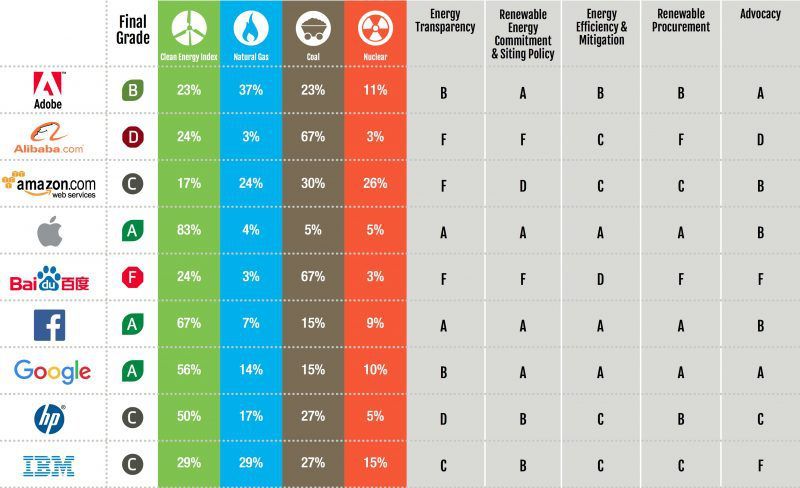
Greenpeace has declared Apple to be the most environmentally friendly technology company in the world for the third year in a row. The conclusion was reached in the environmental organization's latest report, entitled Clicking Clean: Who is Winning the Race to Build a Green Internet, which awarded Apple a final 'A' grade and a clean energy index score of 83 percent. Facebook and Google also scored 'A' grades, with clean energy index scores of 67 and 56 percent respectively. "Thanks to the leadership and advocacy of companies like Apple, Google, Facebook, and Switch, we are seeing the tech industry make major strides toward powering the internet with clean energy," Gary Cook, Greenpeace's senior IT analyst, said in a statement. The report ranked companies on a range of green credentials, from energy transparency and renewable procurement to energy efficiency and mitigation. Nevada-based telecoms company Switch, which develops data centers, was the only company in its sector to be awarded grade A's across the board, with a 100 percent clean energy index. According to the report, Apple "played a catalytic role within its IT supply chain, pushing other IT data center and cloud operators who help deliver pieces of Apple's corner of the internet to follow their lead in powering their operations with renewable energy". Apple, Google, and Facebook pledged in 2012 to commit to 100 percent renewable energy sources. Apple's new Cupertino campus, which is currently under construction, will run entirely on renewable energy, thanks to an estimated 700,000 square feet of solar panels. Despite the positives in the tech sector, the report highlighted concerns with regards to emerging East Asian internet companies, which lack access to renewables from monopoly utilities in those regions. "Without key policy changes, the rapid growth of the internet in East Asia will likely be powered by coal and other dirty sources of electricity," the report stated. According to Greenpeace, the north and southeast Asian region is the world's biggest emitter of CO2. From: https://www.macrumors.com/2017/01/10/greenpeace-apple-cleanest-tech-company/
This video is about California ISO Symposium 2016 - Mike Petouhoff
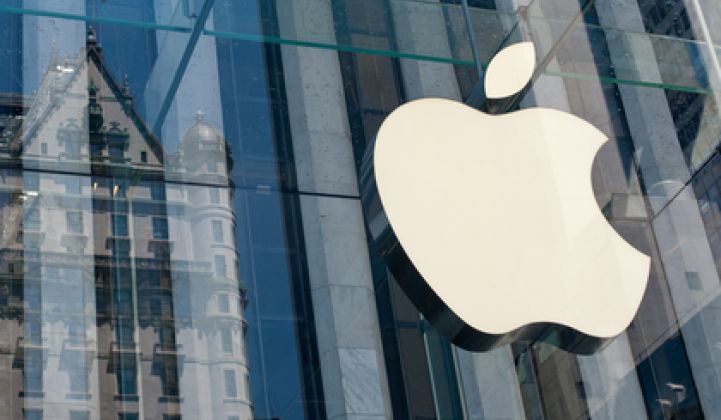
Apple has pledged $848 million for solar power from First Solar's 130-megawatt California Flats Solar Project in Monterey County, Calif. under a 25-year power-purchase agreement (PPA) with Pacific Gas and Electric. This is the first wholesale commercial and industrial PPA executed by First Solar, and it's Apple's fourth solar farm project. "Apple's commitment was instrumental in making this project possible and will significantly increase the supply of solar power in California," said Joe Kishkill, First Solar's chief commercial officer, in a release. Facts about the California Flats Solar Project: • It's on 2,900 acres occupying 3 percent of a property owned by Hearst Corporation in Cholame, Calif. (the Jack Ranch) • Construction is expected to start this year, and is slated to be finished by the end of 2016 • The output of the balance of the solar farm will be sold to PG&E under a separate PPA • The project is fully subscribed with the Apple and PG&E PPAs • The facility is going to consist of a mix of fixed-tilt modules and single-axis trackers, according to a First Solar spokesperson According to a release, "In January, the Monterey County Planning Commission unanimously approved the California Flats Solar Project, sending the project to the Monterey County Board of Supervisors, which will consider final approval of the project today."
Moving to the cloud could be making acid rain. While U.S. companies are not required to disclose energy information, such as carbon emissions, a report by Greenpeace revealed the high cost of the data centers tech companies rely upon to deliver their services. Apple was the least green of all, with its data centers at 54.5 percent reliance on coal, followed by Facebook at 53.2 percent and IBM with 51.6 percent. Yahoo, Google and Amazon were highlighted for their clean energy use. As cloud computing becomes more widely adopted, companies will need to support a rising number of data centers in order to process and store the information that’s generated. While Greenpeace was able to produce its report based on publicly accessible data, tech companies also display major problems with transparency regarding their energy practices, the report showed. Despite Google and Amazon’s clean energy commitments, both scored an F for transparency. As the report notes, the expansion of the Internet will require a growing amount of energy to continue. But a tendency towards secrecy across the IT industry prevents it from being possible to fully gauge the extent of IT’s potential effect on the worldwide energy picture. According to Greenpeace, data centers may be consuming energy at a rate 70 percent higher than predicted, with the combined electricity demand of the web estimated to reach a figure greater than the combined total demands of France, Germany, Canada and Brazil combined. The data centers are themselves projected not only to continue growing in size (many are already the size of several department stores), but to consume more and more energy. Right now, Greenpeace predicts that U.S. data centers account for 3 percent of the national power supply. Apple’s new $1 billion data facility in North Carolina is estimated to require the equivalent the energy needed to power of 80,000 U.S. homes. North Carolina is the hub for what Greenpeace calls a “dirty data triangle,” referring to a trio of giant data centers run by Apple, Google and Facebook. North Carolina provides an attractive set of tax incentives, as well as the promise low-cost energy, offered in an initiative by local economic development agencies to battle high unemployment and draw IT companies to the area. But the generation mix in the area is one of the dirtiest in the country, drawing only 4 percent from renewable sources, and 61 percent from coal. But many of Google’s practices prove to be far more eco-friendly than those pursued through its North Carolinian data hub. The company has shown a commitment to green goals, signing a 20-year power purchasing agreement with a wind energy company in Iowa, and investing $100 billion in an Oregon wind farm, as well as setting up subsidiary Google Energy to let it buy and sell wholesale energy. Still, the report emphasizes the double standard in the IT sector regarding transparency. Though companies like Google and Facebook access huge amounts of personal data, they are cagey about revealing their own carbon footprints and energy decisions. But as these companies become important buyers of energy, the need for openness is greater than ever: without more information, the rest of the world will be left in the dark as to how these actions will affect the world’s environmental future. From: https://www.huffingtonpost.com/2011/04/21/apple-green-ranking-greenpeace_n_851939.html

